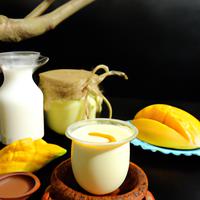
1 serving (250 grams) contains 150 calories, 5.0 grams of protein, 3.0 grams of fat, and 28.0 grams of carbohydrates.

Log this food in SnapCalorie

Nutrition Information
Calories |
142.0 | ||
|---|---|---|---|
% Daily Value* |
|||
| Total Fat | 2.8 g | 3% | |
| Saturated Fat | 1.9 g | 9% | |
| Polyunsaturated Fat | 0 g | ||
| Cholesterol | 9.5 mg | 3% | |
| Sodium | 47.3 mg | 2% | |
| Total Carbohydrates | 26.5 g | 9% | |
| Dietary Fiber | 0.9 g | 3% | |
| Sugars | 23.7 g | ||
| protein | 4.7 g | 9% | |
| Vitamin D | 94.6 mcg | 473% | |
| Calcium | 189.3 mg | 14% | |
| Iron | 0.5 mg | 2% | |
| Potassium | 283.9 mg | 6% | |
* Percent Daily Values are based on a 2,000 calorie diet. Your daily values may be higher or lower depending on your calorie needs.
Food Attributes
Source of Calories
About Mango milk
Mango Milk is a creamy, tropical beverage made by blending fresh, ripe mangoes with milk and often sweetened with sugar or honey. Originating from South Asian cuisine, this drink is particularly popular during hot weather, serving as a refreshing treat. Mangoes are rich in vitamins A, C, and E, as well as antioxidants that support skin health and the immune system. Milk provides calcium and protein, aiding in bone strength and muscle development. While the drink is naturally nutritious, added sugars can increase its calorie content, making moderation key for those monitoring their sugar intake. Mango Milk can be enjoyed as a snack or dessert, offering a delightful combination of fruity sweetness and creamy richness. For a lighter version, it can be prepared using low-fat milk or milk alternatives.



